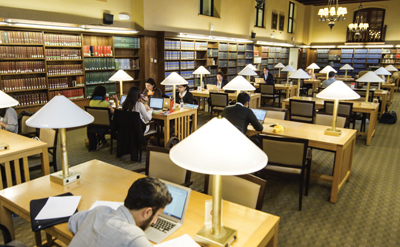2016 Graduate Education
THIS GUIDE IS NO LONGER ACTIVE. For the current FP Guide, click here.
The Fletcher School of Law and Diplomacy at Tufts University
“Critical-thinking skills are crucial for international affairs professionals,” says Michele L. Malvesti, professor of practice in the International Security Studies program at The Fletcher School of Law and Diplomacy at Tufts University.

The Fletcher School
“In addition to discipline, teamwork, and the motivation to learn, you also need the conceptual tools to challenge assumptions and distill information to the most salient points,” says Malvesti. “If you have these core competencies, you can adapt your career in an unpredictable world.”
Malvesti should know; early in her own career, she spent five years as a terrorism analyst in the intelligence community, primarily with the Defense Intelligence Agency. In 1998, shortly after the U.S. embassy bombings in East Africa, she entered the Master of Arts in Law and Diplomacy (MALD) program at The Fletcher School as a transition away from the field of counterterrorism.
“I wanted to nourish my intellectual passions and open the aperture for future possibilities,” says Malvesti. Then 9/11 changed her outlook. Malvesti was in the midst of writing her PhD dissertation at Fletcher when the planes hit the Twin Towers and the Pentagon, and she felt called to return to duty.
In addition to discipline, teamwork, and the motivation to learn, you also need the conceptual tools to challenge assumptions and distill information to the most salient points.“My earlier career in government, coupled with my academic training at Fletcher, prepared me to return to government—directly into the White House, where I would spend more than five years in the Office of Combating Terrorism on the National Security Council staff,” says Malvesti.

Michele L. Malvesti
In the ensuing years, Malvesti broadened her professional portfolio to include work with government contractors. “Service to your country isn’t just about working in government,” she says. “Working outside of government opens your eyes to other ways we can contribute.” Working for a defense contracting firm, for example, can present opportunities to develop solutions for government customers and international partners.
Before returning to her alma mater last January as a full-time Fletcher professor, Malvesti had been teaching at Yale University’s Jackson Institute for Global Affairs since 2012.
Back “home” at Fletcher, Malvesti especially values the shared sense of community and mission among the school’s intellectually and culturally diverse mix of students and its distinguished faculty.
She also welcomes the chance to shift her perspective beyond the scope of the political world. At the same time, drawing on her experience in Washington, Malvesti brings practical skills into the classroom and tries to leverage students’ real world experience in addressing global challenges.
“Students at Fletcher are prepared to understand pressing global problems and use interdisciplinary tools to help solve them,” she says.
Malvesti looks forward to teaching three classes in the 2016–2017 academic year: (1) National Security Decision-Making—Theory and Practice; (2) Women in National Security; and (3) Power and Conflict in Cyberspace.
Contents
- 2016 Graduate Education
- Association of Professional Schools of International Affairs (APSIA)
- Boston University, Frederick S. Pardee School of Global Studies
- Central European University (CEU), School of Public Policy (SPP)
- Columbia University, School of International and Public Affairs (SIPA)
- The Fletcher School of Law and Diplomacy at Tufts University
- Georgetown University, Walsh School of Foreign Service (SFS)
- Indiana University, School of Global and International Studies
- Johns Hopkins University, School of Advanced International Studies (SAIS)
- Seton Hall University, School of Diplomacy and International Relations
- University of Kent, Brussels School of International Studies (BSIS)
- University of Minnesota, Humphrey School of Public Affairs
- The University of Texas at Austin, Lyndon B. Johnson School of Public Affairs
- University of Washington, Jackson School of International Studies

